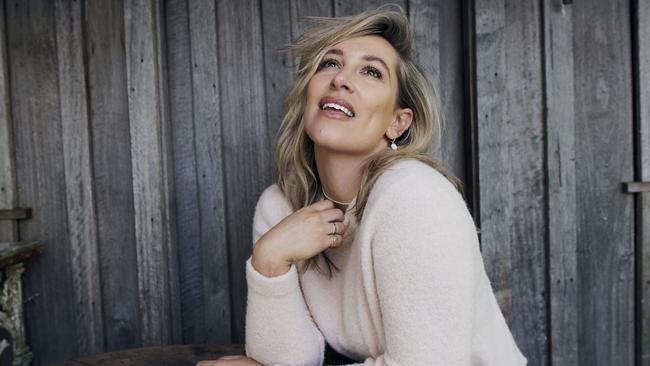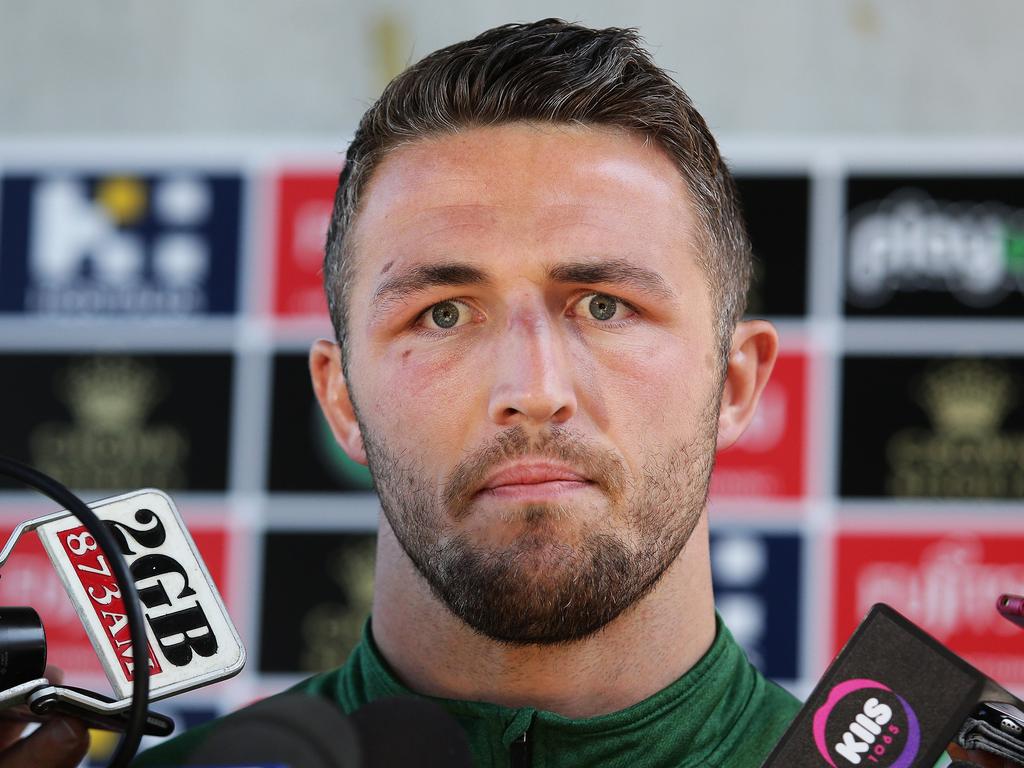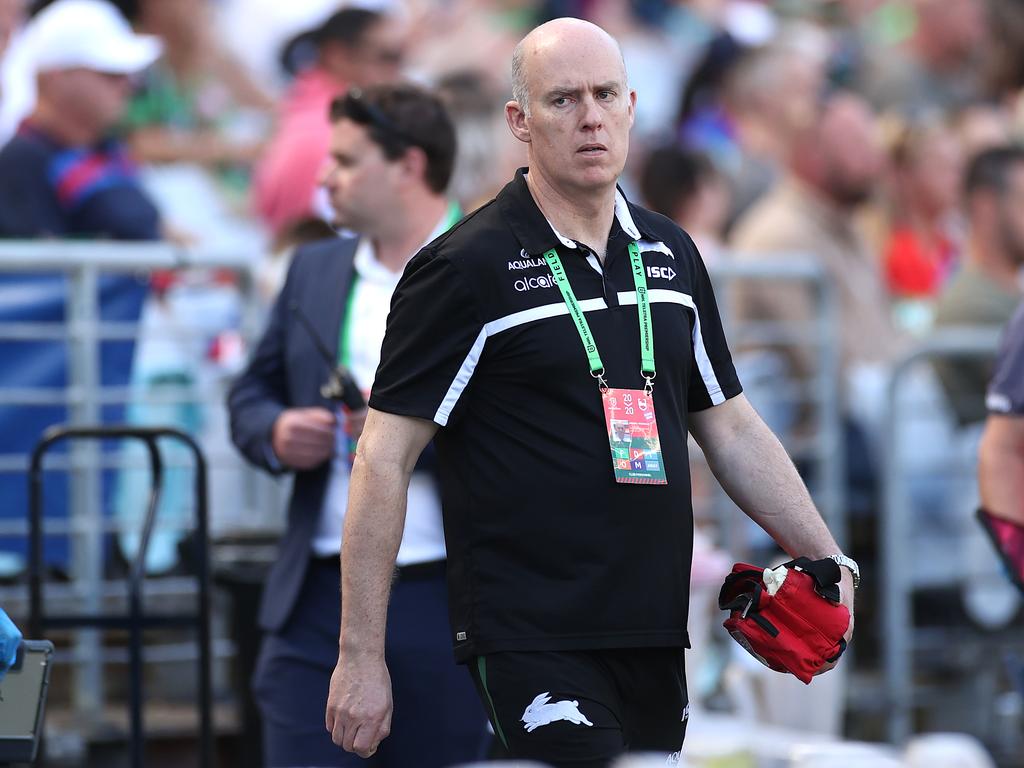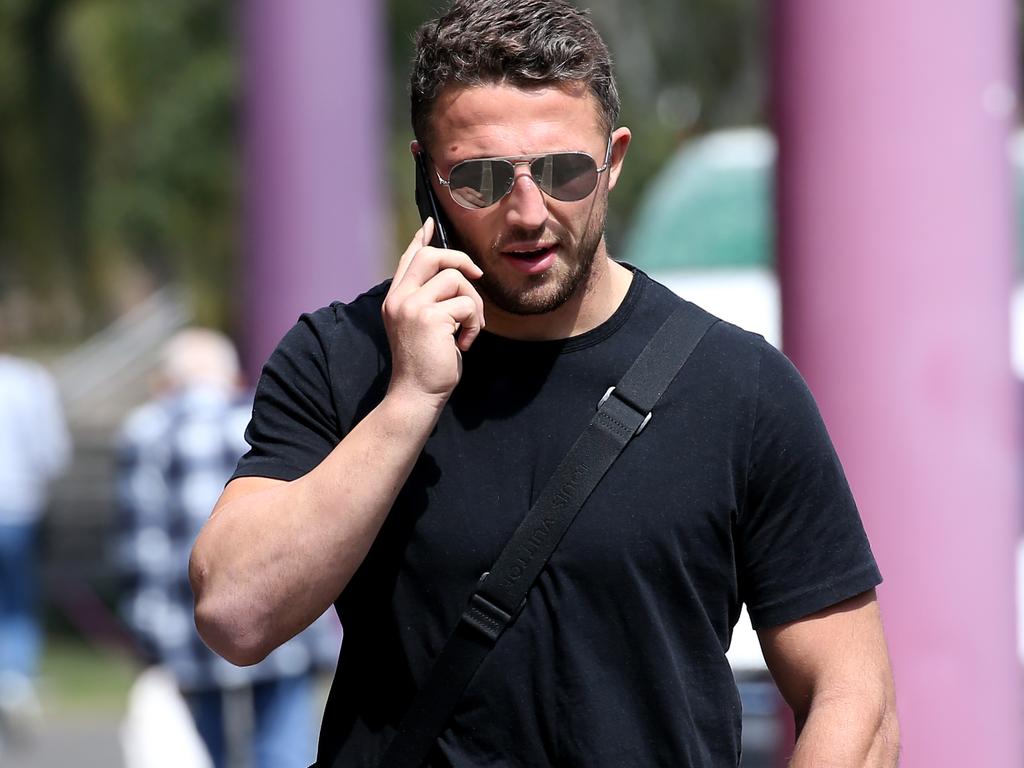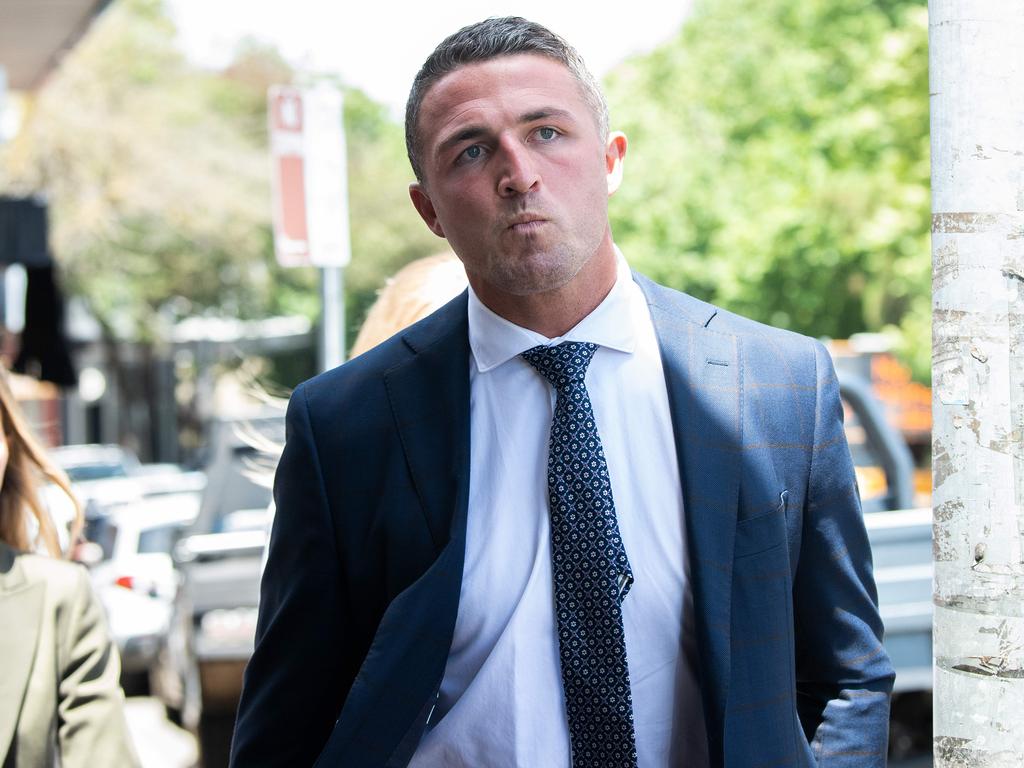Phoebe Burgess calls out rugby league’s ugly secrets
After her scandal-plagued marriage, Phoebe Burgess is calling time on the redemption narrative, breaking her silence on the NRL’s culture of misogyny, lies and cover-ups.
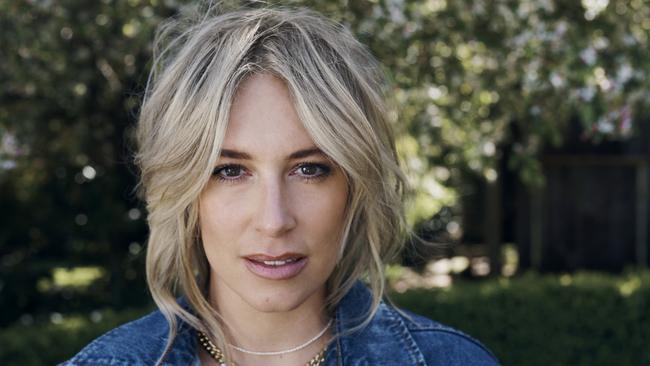
At night, when she has tucked her two young children into bed, Phoebe Burgess goes through her messages on Instagram and absorbs the desperation of strangers. Women asking for advice. Revealing secrets they don’t even tell their sisters, secrets about relationships that are broken, dark, full of hateful words and raised hands. Burgess responds as often as she can – I hear you, wow, that must have been so awful, thank you for telling me, you’ve taken the first big step. And then she crawls into bed alone, or with one of her sleeping babies, and lies awake listening to a voice in her head, the voice of the man she loved, calling her a lazy mother and a weak c..t. “A lot of people think I’m a bit of a princess,” Burgess says, “but this princess has had to be gritty. Gritty enough to survive.”
At 32, Phoebe Burgess is one of Australia’s most successful influencers, with close to 80,000 followers on Instagram and a suite of brands that want a slice of her late-afternoon-sun ambience. She has a degree in media and communications, majoring in French, and worked as a TV producer and magazine journalist before, at 26, marrying rugby league superstar Sam Burgess and embarking on what looked like a glamorous romantic adventure, with two children soon completing the picture.
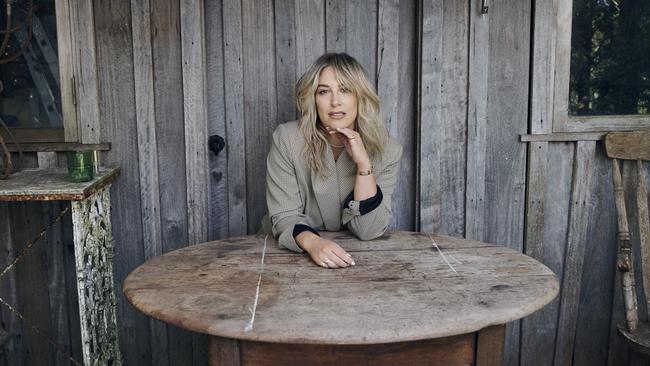
Burgess was modern rugby league’s first rock star on and off the field; universally regarded as a good guy and a hard partier, a charismatic Yorkshire charmer dubbed the “sparkly-eyed man” by Russell Crowe, the co-owner of South Sydney Rabbitohs. Now the couple’s glittering marriage has become Australia’s most infamous breakup, complete with allegations (which Sam Burgess has denied) of a drug-fuelled episode in their home, court cases, a police strike-force, a rugby league integrity investigation and now a reality television “redemption” opportunity where he sheds tears of regret and performs feats of strength on the Seven Network’s SAS Australia.
Those women in Phoebe Burgess’s DMs aren’t buying it. “After beginning to watch SAS I have had to stop. I can’t stop thinking about how you’re feeling,” one woman wrote when the changed-man narrative began airing in primetime. Hundreds of women contact Phoebe to share their stories, from discovering infidelity and wondering how to get out of a troubled relationship, to suddenly being left a single mum with little kids.
On their behalf, and her own, Phoebe Burgess feels a sense of betrayal that her private hell would be used as a reality TV storyline. She is, in fact, livid, and not just with her ex-partner, as she calls him. This whole sorry episode has spurred her to go public with what she knows, to call out the powerful individuals and institutions in rugby league she accuses of moral negligence – for pressuring her to stay in a marriage where she was lost and afraid, for failing to help her husband get the help he clearly needed, and now of allowing him to act like everything is fixed. “This is the interview I never wanted to give,” she says. “These are questions I never wanted to answer.”
For the first time, a woman who’s seen rugby league from the inside is calling out its ugly secrets: the way clubs use their power and influence to shield, excuse and forgive players’ behaviour. It is no small thing for any one person to go up against a powerful football machine. Over years of reporting, The Australian has dealt with scores of women who have had traumatic encounters with footballers. Without exception, they have been silenced by smear campaigns, payouts, non-disclosure agreements, legal threats and the fear of being pilloried in public as a slut, a crazy wannabe, a woman scorned.
For Phoebe, this is not a breakup vent. “I want to challenge some very powerful people to look at their own behaviour, to look at the way they handled the situation, the role they played in all of this,” she says. “Silence is the refuge of abusers, the refuge of perpetrators. It gives them the perfect cover.”
We’re talking at her family home in the Southern Highlands of NSW. She’s wiping tears from her cheeks. Her nails are a cheerful shade of red, painted by four-year-old Poppy, who is inside with her grandparents. Phoebe takes a deep breath. “I live every day as though I have been through a loss. I loved him dearly. I miss him so much,” she says, tears streaming down her face. “But he wasn’t handled. He wasn’t looked after. He wasn’t protected in the right way, in the way that may have – not saved our marriage, but it might have led to a true rehabilitation, a true sense of responsibility, owning behaviour, wanting to change that behaviour. Instead of what I’m seeing, disappointingly, being a careful edit, a carefully curated comeback show.”
In October last year The Australianpublished evidence the South Sydney Rabbitohs had actively concealed Burgess’ drug use and wild behaviour, sparking investigations by NSW Police, the NRL’s Integrity Unit and healthcare authorities, all of which are ongoing. Burgess denied any wrongdoing at the time. On SAS Australia he admitted: “I’ve lost my career, my kids and marriage… there was a police investigation into me. Turned to drinking, drugs. I’ve lost it all… I wasn’t the greatest husband… I embarrassed my wife.”
He also implied there was a fundamental mismatch from the start: “There were a few things I knew weren’t quite right, but I thought I could change that and help that, mend that… I couldn’t do it.” Burgess described his mother, Julie, telling him: “You’re just never going to make her happy. I don’t know how you’ve done two years.”
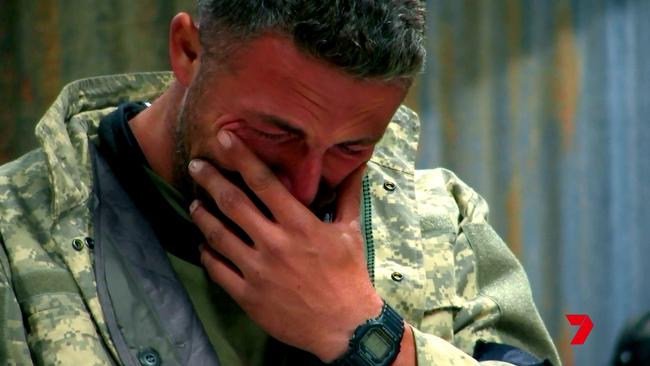
Phoebe Burgess can’t go into detail about what happened during her marriage. But she has been through a powerful feminist awakening. The women who reach out to her use phrases like “gaslighting” and “coercive control” to describe situations that have until very recently been poorly defined and difficult to recognise, even when you’re living them every day. Burgess knows her privilege – education, income, family – helped her in a deeply painful situation. The child of a tranquil and stable home, she had no experience of toxic relationships or problematic behaviour when she married at 26, and hopes her experience might help other women who may not have had those privileges and may be struggling to articulate, especially to themselves, what’s going on in their own lives. “I’m telling you this because I want women to read this,’’ she says.
Bondi Junction shopping mall. September 2018. Sam and Phoebe Burgess had just watched Crazy Rich Asians at the movies and were heading to the carpark, looking forward to seeing eight-month-old Poppy, at home with a babysitter for this rare date night. “We were walking out of the cinema and I looked up. Sam was holding my hand and he just went white. It looked like he was going to vomit. And then he started crying in the middle of the centre,” she says. “And we got to the car and he said: ‘Get in, get in.’ He was looking around. He was paranoid. And he just looked at me. He said, ‘Darling, I’ve f..ked up. I’m so sorry.’ Then he told me.”
The Daily Telegraph had a story it was preparing to print the next morning: a 23-year-old woman said she had been left feeling “violated and disgusted” in May 2018 when Sam Burgess exposed his penis to her during a series of sexually charged video calls that included other Souths players, including one who pulled his pants down to show his buttocks. The woman said she had contacted Burgess via social media and the pair had exchanged written messages before Burgess said: “The boys want to FaceTime,” and called her on Facebook Messenger multiple times, both with other players and alone. “It started off as a funny [video call] with the group of boys and because I am a huge NRL fan I was on quite a high,” the woman wrote. “However after the 5th, 6th and 7th call coming from one of the players by himself in his room, I began to feel violated and disgusted.”
The woman said she had complained the following day to Souths, but never got a reply. When she went public, the narrative was spun out in the background: the woman was a Roosters fan who’d laid a honeytrap; the story was deliberately timed to unnerve the Souths players before the semi-finals; she’d consented to all of it; it wasn’t that bad anyway, was it? Burgess stood up at a post-training media conference: “I’m fortunate that I’ve got a strong wife. I’ve got a wife who loves me. I’ve got [a] great family. I’ve got great friends. Great support around me to help me through these allegations that have been made. It’s been a tricky few days.”
And then the deluge began. “We got a call in the middle of the night,” Phoebe says. Another woman had come out saying she’d had an affair with Sam in 2017. (Burgess confessed to this affair on SAS Australia: a woman in Melbourne he saw for several weeks while captaining England in the Rugby League World Cup.) “That was probably the worst night of my life,” Phoebe continues. “I felt physical pain when I found out about that. I howled for about two hours on the ground.”
Each time a crisis loomed around her husband, Phoebe says a familiar pattern would emerge: the club would require the couple to disappear, and would organise a sudden escape with private jets and drivers. They would be sent either to her parents’ home, a country property owned by a figure connected to Souths, a private luxury compound in Sydney’s eastern suburbs or a tropical resort. Only carefully choreographed outings would be allowed. This is not unusual – often, when a star player is in trouble, the PR machine kicks into gear, hiding the player and his family while backgrounding favoured journalists about the “real story” behind it all.
Souths cleared all its players of misconduct in the sexting scandal, saying no rules had been broken. The NRL Integrity Unit also said it could not find any wrongdoing. “I have not sexted anyone,” Sam Burgess insisted. “I fully co-operated with the inquiry as I said I would. I have engaged lawyer Chris Murphy to pursue my remedies and he has retained defamation lawyers.” No legal action has been commenced to date.
Phoebe shakes her head in disbelief at the chaos that unfolded around her at this time. She tells of putting on a brave face in a private box at Stadium Australia when she was pregnant with her second child, Billy. “I was heckled by the crowd, drunk people asking me if I wanted to FaceTime, and asking me where my husband was and, you know, was it his baby? It was demeaning and humiliating.” Twice while pregnant with Billy she says she was tested for sexually transmitted infections because her husband had told her he had unprotected sex.
Thus began the cycle Phoebe now recognises as typical: a crisis, a dramatic response, a separation, apologies, promises to reform, a sweet, tender honeymoon period of forgiveness, and slowly, all the while, the build-up to the next crisis.
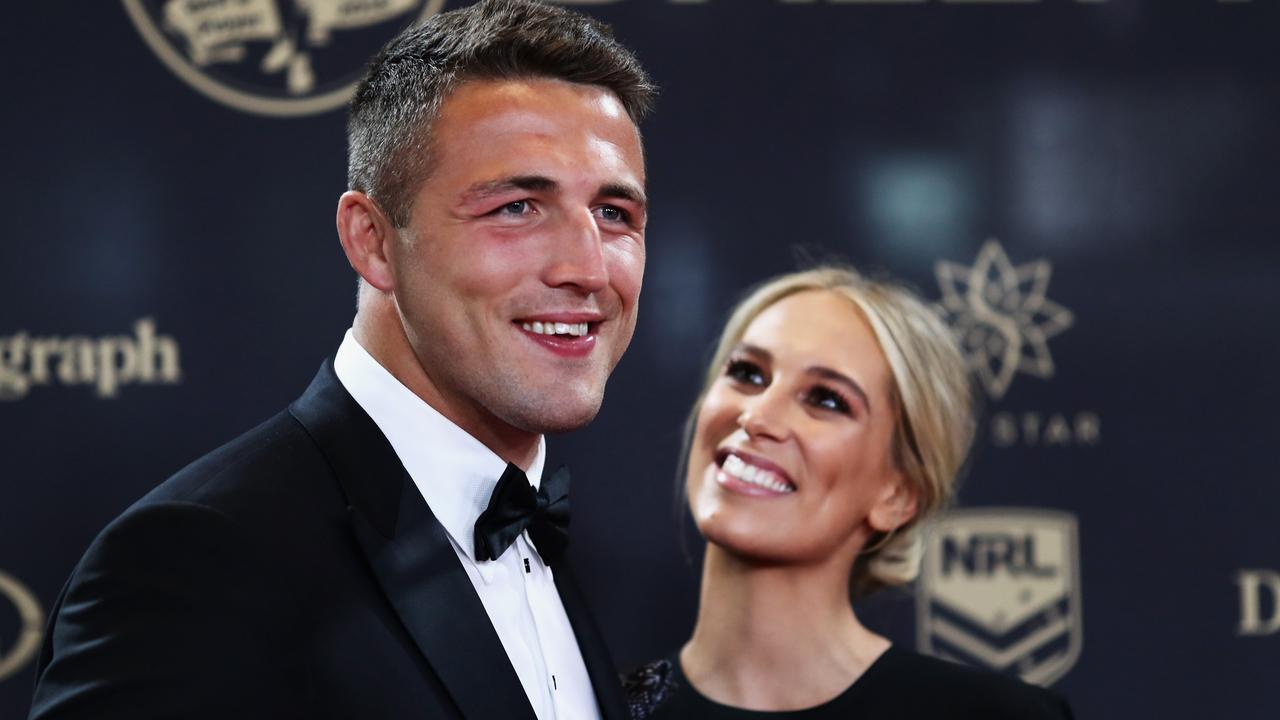
In the course of the next year she would be contacted by more women who told her they’d slept with her husband. Some said they were shocked to discover he was married and wanted to apologise. The Weekend Australian Magazine has independently confirmed other women complained to Souths about Sam Burgess, and Phoebe has communicated with some directly – but she says Souths never once told her about the complaints. “I felt like I was living with a man that I just didn’t know. I felt guilty that this person who was my husband, who was meant to be in a committed relationship with me, was actually hurting so many other women. At the same time, I felt that I had missed something. I thought it was up to me to try and fix him, to make sure that didn’t happen. And if everyone just kept quiet, maybe it was something that we could deal with.” It was a view encouraged by the club: “You need to be your man’s champion, the way he is yours,” one senior figure associated with the club texted her. “There were things that the club knew that I didn’t,” Phoebe says. “I was kept in the dark in my own marriage, my own relationship.”
As Souths ran the crisis communications, Phoebe fell into her own system: as each scandal blew up she would withdraw from social media and public engagements, then return quietly a few weeks later to live up to her commitments to the brands who were paying her for that serene prettiness she’s so very good at. It felt forced, at times, to be talking about baby bath soap and beautiful clothes but in the direct messages she was already beginning to see those women reach out, asking if she was OK. Sharing their own awful situations.
Phoebe felt compelled to call some of the women who’d slept with Sam. “I said to them that I wasn’t looking for anything, that I didn’t want a confrontation. I wanted to hear their story. I wanted them to feel validated by telling me because I was part of that relationship. And I thought that might help them. And I ended up apologising to the women I spoke to.” She also spoke with the woman at the centre of the sexting scandal. “I wanted to apologise to this woman that she’d been dragged into this – and I wanted to understand what she’d been through. The media strategy was to turn the player into the victim by saying she lured him into it by flashing her breasts. This kind of manipulation is what stops other women coming forward when they feel they’ve been violated. What chance does one woman have against a PR machine?”
Over the years The Australian has spoken to dozens of women who have been silenced after a rugby league scandal: club employees pressured into sex with footballers and then laughed off or mocked by executives; women who’ve had troubling sexual encounters where consent was unclear; wives and girlfriends who have tried and failed to get clubs to help force a player into counselling for gambling or substance problems. These women claim the clubs simply don’t want to know. They did, however, know how to silence a complainant, either with a small payout and an intimidating legal letter, or an active smear campaign, or both.
We have also spoken to several generations of leaders in the code who have tried to institute reform but have been stymied by clubs’ intransigence. For many clubs, suspending or sacking players, or taking them off-field for rehab or counselling, is at odds with the business model of on-field performance. One former club chair says rugby league will never reform unless there is a uniform code of conduct agreed by all clubs.
Football clubs pride themselves on being an extension of their players’ real families. It’s part of the selling-point when a club is trying to secure talent: join us and you’ll be looked after. Indeed, some footballers come out the other side barely able to look after themselves. It’s not unusual for club staffers to oversee players’ bills, laundry and even families: one club had a staffer write a condolence card for a player to his dead uncle’s relatives. “We just do everything for them,” one former Souths club staffer said. “We are their parents.”
The Rabbitohs were fully aware of Sam Burgess’s growing problems with drugs, alcohol and infidelity, Phoebe says. “So when I was asked by the NRL Integrity Unit (investigating the allegations published in The Australian last year), ‘Did you tell anyone at the club?’ – well, Sam was more than just a player. Our lives were enmeshed with the goings-on of the club. And it was clear in the structure of the club that the rules applied to some players and not others.”
Souths chief executive Blake Solly, in response to questions from The Australian, including whether the club failed to adequately assist Burgess, said in a statement: “The club takes issues of drug use and excessive alcohol use very seriously… The club works closely with the playing group to support their wellbeing and educate them about drug use and also works closely with Sport Integrity Australia and the NRL who administer testing of the players. The club has supported, and will continue to support, players who seek treatment or rehabilitation.”
Phoebe says at that fevered time during her pregnancy, life at home became full of substance- induced screaming rages. In a statement to police in October 2020 she alleged her then-husband forcefully squeezed her pregnant body during a drug-fuelled psychotic episode in their home, in the presence of medical staff linked to Souths and her parents. This allegation – denied by Sam Burgess – was the subject of The Australian’s October 2020 story. Police, the NRL and the Health Care Complaints Commission are still investigating. “These were things that I shouldn’t have been tolerating in a relationship,” Phoebe says. “I was still protecting someone who was broken and behaving in such an abhorrent way, you know, leading up to the birth of my son, the drugs, the alcohol, partying, the benders, the begging.”
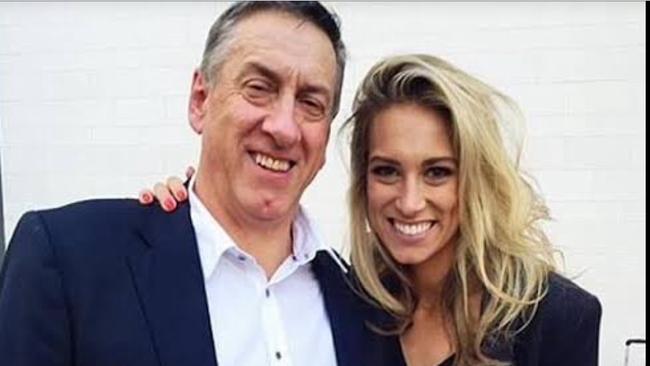
A senior figure linked to the club spent dozens of hours on the phone to her father, former Minerals Council chief executive Mitch Hooke, advocating for Sam and vowing he was capable of reform. Hooke still has scores of pages of handwritten notes he made during these calls. “I still can’t believe this man thought my marriage was something on the table to be negotiated with my father,” Phoebe says. She says she had daily calls with the same man in which she detailed her fears about her husband’s drug and alcohol use and his behaviour at home. She wanted the club to help him, not excuse him. “I called him from the kerb saying I didn’t want to go inside. I called him after Sam had screamed at me. I sent him pictures of pill bottles. This was me crying, literally crying down the phone for help. I was screaming, ‘Stop’. I was screaming: ‘Help us, get me out of this. Someone help me.’ I went all the way to the top of the club, to people who we believed loved and cared for us.”
Phoebe says she became frightened by her own desperation to avoid another outburst, recounting one day after Billy’s birth. “I’d spent a day with my newborn and Poppy, I was tired and I was sore and I knew Sam would get home at 4pm. So I cooked something and made sure I looked really nice. Because I just couldn’t handle another explosion. If everything was perfect… then maybe it would work out. Even at that point, I knew it wasn’t normal to be on edge when you’re waiting for your husband to come home from work. It wasn’t normal to be putting lipstick on when you’re trying to feed a newborn. It wasn’t normal to try to account for every hour of your day. Explain it. So he wouldn’t call you lazy or a c..t. You know, I just – so much had been taken away from me, so much dignity.”
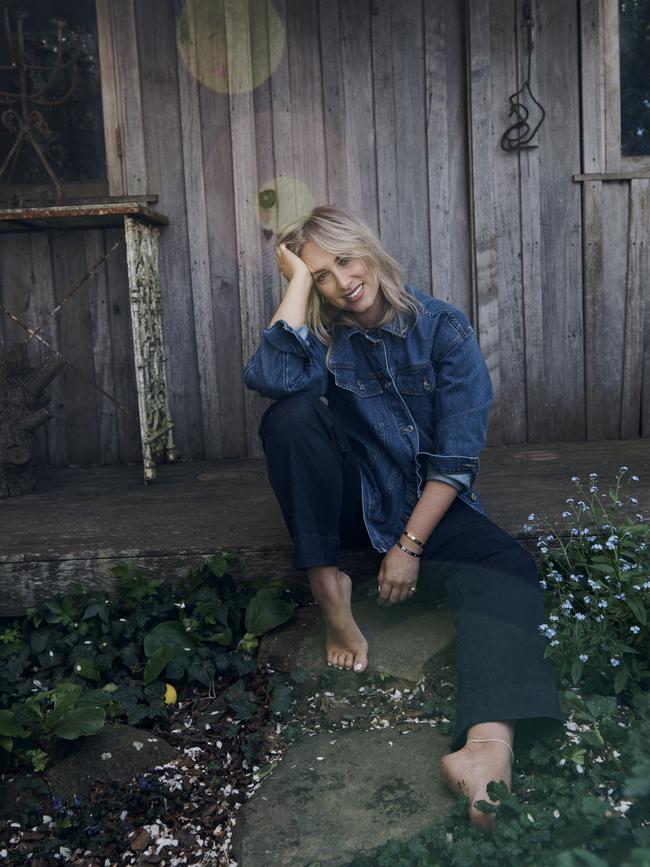
After yet another partying episode, Phoebe walked out two days before Christmas 2018. Billy was nine days old. “Sam had gone out with his family until 4am. I had just had a caesarean. I couldn’t even pick up my son. So I got my Mum to come down and help me.” She felt belittled, worthless, exhausted. “From the outside, and in hindsight, the way out looks so obvious. But it took every ounce of strength I had to call my parents… my lifeline.”
This separation was not the end of the couple’s troubles. On October 19, 2019, Phoebe ran inside the Hooke family property and dialled triple-0. “I’m just a bit shaken up, my husband and I are going through a bit of a separation at the moment… He’s threatened and abused my father… It’s Sam Burgess so it can’t be made public, but I just need to report it, because he’s still in the area and he’s really angry,” she told the operator in a recording later played in court. “He’s done this to me too.”
Burgess was charged with a domestic violence-related intimidation charge. He pleaded not guilty but was initially convicted, with a magistrate in February 2021 finding he screamed in Hooke’s face: “F..k you, I’m going to get you,” when Hooke asked him to leave the property after an agreed visit with the children. Burgess denied this and his lawyers said while there was an argument, he did not swear or threaten. The lawyer told the court the allegations were “born out of malice or retaliation”.
A month later, the conviction was overturned on appeal, with a District Court judge finding it was “the word of Burgess against the word of Hooke” and the Crown had not made its case beyond reasonable doubt. On the evening of the triple-0 call, police officers sat with Phoebe and asked her if anything like this had happened before. “I just spoke for about two hours and it was things that I didn’t even know that I knew.” She had never told her sisters or her parents, Mitch and Sarah, exactly what had been going on.
In May this year, Sam Burgess pleaded guilty to driving with traces of cocaine in his system after police pulled him over on the way to visit his children in Bowral in February. Magistrate Mark Douglass imposed a nine-month good behaviour bond and ordered him to take a traffic offenders program, saying he was satisfied Burgess was remorseful. “He’s been to counsellors and is undergoing a very strict regimen in relation to the non-use of drugs,” the magistrate said. “The Sam Burgess before the offence on the 22nd (of February) is different to Sam Burgess afterwards.”
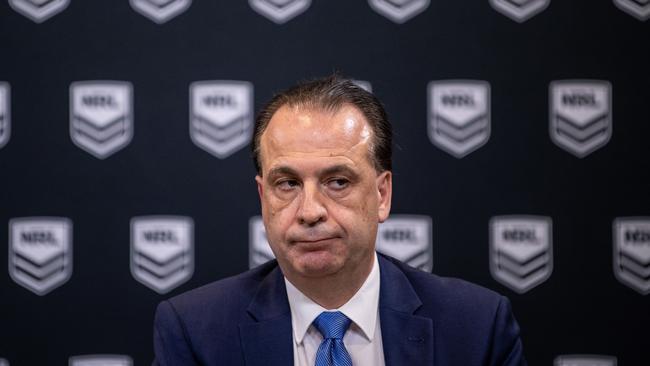
The past few years have not been good for rugby league’s reputation. Former superstar Jarryd Hayne is in jail for sexual assault. Dragons player Jack De Belin has recently returned to the field after pleading not guilty in two trials for allegedly raping a woman, in company with another man. In both trials, the jury could not agree on a unanimous or majority verdict and prosecutors decided not to pursue a third trial. This year NRL fans have been subjected to sex-tape scandals, allegations of revenge porn, public brawls, domestic violence allegations, an ex-wife suing a player for allegedly raping her, Covid lockdown breaches including married players sneaking women into the bubble for sex and more, always more.
The NRL has handed out more than $1 million in fines so far this year, and chief executive Andrew Abdo and chairman Peter V’landys, who are determined to reform the game, want to increase the maximum fine for an individual offence from $50,000 to $130,000. The NRL already has a no-fault stand down policy where a player is automatically suspended with pay if he is charged with an offence carrying a penalty of 11 years in jail or more – that is, serious violent offending including sexual assault. If not convicted, the player can return to the field, as De Belin has.
Asked to comment for this story, Abdo said: “There is no place in rugby league for substance abuse, disrespect or abuse of women. Where any individual breaches our rules, we take strong action – both in terms of sanction and rehabilitation. The NRL spends millions of dollars every year on education, training and wellbeing services for our athletes, and many are leaders in our communities on critical issues such as ending violence against women. The NRL has shown that it will not shy away from doing the right thing, even where an outcome might be uncomfortable or damaging for us in the short term.”
Phoebe Burgess wants her story to be the catalyst for further change, a fundamental reform of how rugby league is run. “We roll our eyes whenever we see a scandal in the papers. I know the formula. News breaks. Player goes into hiding. Player comes out and says sorry to everyone. I could run the show, the amount of conversations I’ve sat in on, the amount of strategies, you know, deciding how we’re going to paint this, what we’re going to make this look like. Not only are you not helping someone who might actually be able to turn their life around, who could get off the drugs, who could stop the womanising, and when I say womanising, treating women like cattle, for goodness sake, when I see that happening, I think: imagine if you put the energy from rehabilitating an image into rehabilitating a man.”
All football codes have behavioural problems, but rugby league’s speciality is sexual misconduct caught on video for the purpose of sharing between players, ranging from simulated intercourse with a dog to disturbing group-sex encounters. Perhaps the most shocking was a video entitled “Boot the Slut”, which was uploaded to various porn sites and led to the 2019 arrest of Panthers five-eighth Tyrone May. In the video, a player has sex with a face-down woman while two others put their feet on her head. May pleaded guilty to filming and disseminating the material without consent and narrowly avoided jail with a sentence of 300 hours’ community work.
Just before the Panthers’ grand final win a fortnight ago (in which May played), the club’s chief executive, Brian Fletcher, made a rare admission from clubland that the scandal pointed to a cultural problem, not an individual’s mistake. “It was a hard time but it was a wake-up call for the whole club… We had to fix up the culture of the place,” Fletcher told The Daily Telegraph.
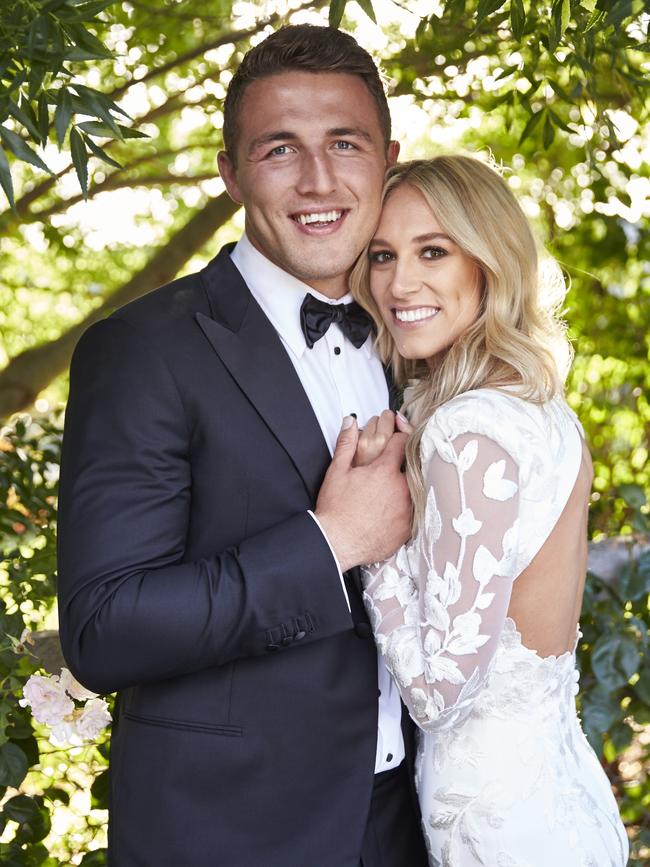
Infidelity is an open secret in the game. Random hookups and organised group sex “gang-bangs” are accepted. “I met many wonderful fathers, husbands and truly good men in rugby league,’’ Phoebe Burgess says. “But there is a seedy underbelly. There was a way of thinking about women called ‘a stable’. They had these casual sexual relationships and they would rotate through the women. You might have five girls in the stable. At one point they would take one out, ride her for a bit and put her back. If she got too attached, too needy, if things became a bit more emotional or questions were asked or if the dates weren’t straight to the bedroom: ‘Oh, she’s out of the stable. I need to replace her.’ It was ruthless. I saw WhatsApp groups containing pictures of conquests. These women were no longer people. They were nothing. It didn’t matter that I was a wife. In the end, I was nothing as well.”
Ask many women who have interacted or worked with footballers and they will tell you there is a widespread expectation that footy players cheat on their wives and share sexual partners with their teammates. If it all gets too messy, they get a lawyer to sort a payout and a non-disclosure agreement. And nobody has tried to stop them. The clubs say it’s none of their business. Head office says it can’t be the moral police. Women who sign non-disclosure agreements are scared to talk to the NRL Integrity Unit. And so it goes on.
Phoebe says the toleration of infidelity puts women directly in harm’s way; it requires the girlfriends to be concealed and silenced, and wives to be kept in the dark. That’s how she ended up having to take STI tests while pregnant. “I would like to see NDAs banned,” she says. “I’ve literally witnessed the silencing of a woman who claimed she was assaulted by a player. I heard a person who’s closely related to the player’s club ply this woman with great kindness and warmth and care to get her into a position where she was able to accept $50,000 and a plane ticket to disappear for her silence.”
The Australian has confirmed a complaint was made to police against a player (not Sam Burgess) in 2019, but that the woman involved subsequently told police she wished to withdraw the complaint. She has declined repeated requests for comment and The Australian has for legal reasons chosen not to name her, the club or the player, who it’s understood has consistently denied any wrongdoing.
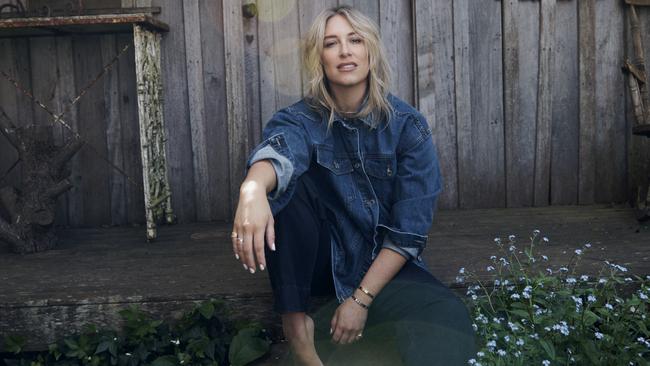
Today, Billy Burgess is two. His big sister Poppyis four. They live an idyllic country life. It’s almost jarring to remember they’re still so young, and that all this has happened in such a short time.
“I read somewhere that it takes women seven times to leave. I think if I had read that two years ago, I would have thought that was just ridiculous,’’ Phoebe says. “Why would you stay in a home that you didn’t want to be in? But when that fear is all wrapped up in love and the fear of failing – did I fail to be a wife? Did I fail to be a mum? Would I be failing my children by leaving? – there’s no way I could have stepped outside of my relationship and I told myself what I needed to hear.”
Tentatively, Phoebe is using her platform to get real, with raw posts about the dark times adjacent to those glorious images. The women who write to her often say they don’t expect her to read or respond. But Phoebe realises the importance of being listened to. “It just takes one person to believe you, just one person to read your story and go, f..k yeah. Yeah, that happened to me. Let’s talk.”
She’s aware she’ll face a backlash to this story. But she knows her kids are absorbing the most meaningful lesson of all. “I want my daughter to know and understand what a healthy relationship looks like,” Phoebe says. “She sees her grandparents, who’ve been married for 38 years. It gives me such joy that she’s able to see such a committed relationship that’s based on mutual respect. I want her to know she can leave a relationship that’s not serving her well, where she’s not happy.
“And with Billy, I’m going to make damn sure that he knows how to respect not only women, not only his partner, but everyone, all human beings. My son needs to learn to respect himself before he’s going to be able to respect others. They are growing up learning what it means to have empathy, and to be responsible for your behaviour and how it affects the people you love. I’m going to break this cycle. My kids are going to be the children that break this cycle.”
Phoebe feels like a shell of the woman she used to be. “I’m pretty broken,” she says, and then laughs at herself for sounding so dramatic. “But I’m free. And I really hope this story helps some women who need to hear this. They deserve to be free, too.”
For 24-hour counselling about safe, healthy relationships call 1800 RESPECT or visit 1800respect.com.au

